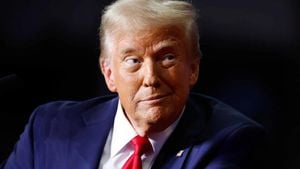With uncertainty looming, TikTok's future hangs by a thread as legislative measures demanding the separation of the popular social media platform from its Chinese parent company, ByteDance, move forward. The law, enacted earlier this year, sets January 19 as the deadline for divestiture. Should it fail to comply, TikTok risks being banned from U.S. soil, forcing app stores and internet providers to cease distribution of the app.
The bipartisan concerns over national security have fueled calls for the app’s divestiture, with lawmakers citing fears possible data harvesting by Chinese authorities could put U.S. users at risk. Federal courts have upheld this law, compelling TikTok to contemplate its next steps.
TikTok, which has become synonymous with short, engaging videos, is now caught between the pressure of the U.S. government and the legal maneuvers of its parent company. Facing the clock, the company has turned to the Supreme Court, hoping to secure favorable ruling interpretations concerning its First Amendment rights. Yet, uncertainty looms about whether the court will take their case.
If TikTok complies and divests, the path isn't straightforward. Identifying a willing buyer at the right price is just the beginning. The complicated nature of such deals is compounded by the potential scrutiny from both U.S. and Chinese regulators. Previous attempts to divest have attracted considerable skepticism and posed significant questions.
For American content creators like Paul Tran and Lauryn Pinkney, both of whom have cultivated flourishing careers on TikTok, this ban could mean more than just losing their primary platform; it could destroy their livelihoods. Tran’s skin care business, Love & Pebble, generates approximately 90% of its sales through TikTok. He exemplifies many creators banking their futures on the platform, potentially left vulnerable should the ban come to pass.
Pinkney, on the other hand, has built her brand around her engaging local content videos, showcasing activities and attractions around Jacksonville, Florida. She amassed nearly 15,000 followers within just one year. “I started by traveling around and I realized you can actually share those moments,” Pinkney illustrated, explaining how her work allowed her to settle her bills and connect with small local businesses. If TikTok vanishes from her arsenal, the ripple effects are likely to disrupt her income.
“This would devastate me,” Pinkney lamented, highlighting the organizational ramifications of the potential ban on not only creators but on the small businesses showcased on her TikTok channel. Businesses benefiting from her engagement on TikTok have reported spikes in traffic and sales based directly on her featured posts.
On the official side, TikTok denounces the rationale behind the ban, arguing it is based on flawed information. Their spokesperson emphasized the legal consequences of the ban could translate to censorship of American voices, rather than upholding national security.
The frenzy surrounding TikTok extends beyond creators. Investors and business moguls eye TikTok as it stands at this crossroads. Billionaire Frank McCourt, who previously owned the Los Angeles Dodgers, has laid down plans to acquire TikTok’s U.S. operations if forced to divest. He envisions employing his Project Liberty initiative to create what he calls “a more open web.”
If McCourt’s bid materializes, he foresees migrating existing users and content from TikTok onto newly structured networks, and he expresses confidence there’s potential success absent TikTok’s algorithm. His offer can be seen as not merely profitable but also as part of his vision for digital freedom.
Yet TikTok’s fate also intertwines with politics, particularly with the upcoming transition to President Donald Trump’s administration, who previously expressed intentions to safeguard TikTok during his campaign. Some speculate whether there could be legislative amendments or executive interventions, potentially reshaping the law governing TikTok's operations.
For the creators relying on TikTok’s platform, the implications are dire. Many are now preemptively establishing their presence on alternative platforms like Instagram and Breez to maintain their follower base. CJ Pearson, known for his political commentary and boasting over half a million followers on X, highlighted the necessity of being agile and adaptable amid uncertainty. “I have faith we will find places to share ideas if TikTok vanishes. We cannot be unprepared for such possibilities,” he noted.
This cascade of developments paints a grim picture for TikTok as the deadline hums ever closer. Preparations kick off on various fronts, but the uncertainty creates amplified worry for the vast digital community thriving on engaging content. When content creators directly contribute to local economies and social discourse, the ban's ramifications could ripple far beyond the app itself.
How will these changes reshape digital content creation as everyone watches the timeline narrow? The stakes are high not just for TikTok, but for the entire community of users, businesses, and investors engaged with the app. The climax of these tensions is expected to manifest right as the deadline approaches, leaving many hopeful yet apprehensive of the verdict.



